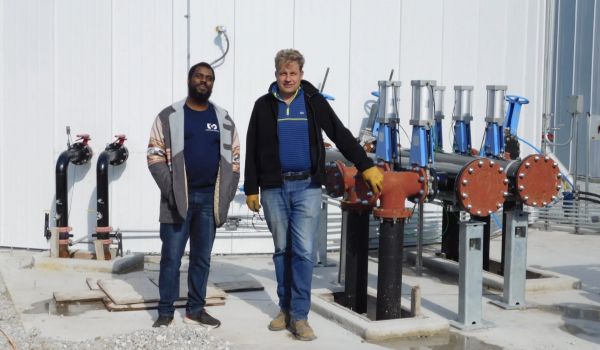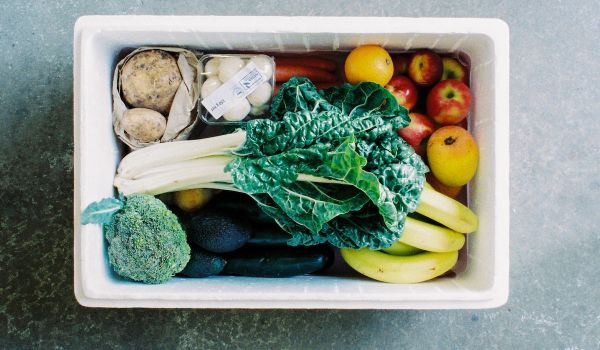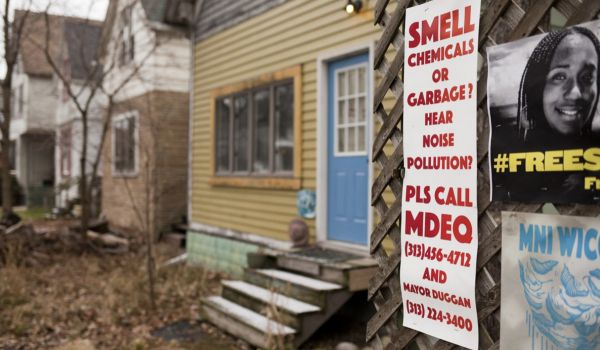They could finally see the ground.
It took weeks of daily digging by around 50 volunteers to reach the bottom of a one square-kilometer landfill in Dandora, the Kenyan town commonly known as Nairobi’s dumpsite, and clear it.
The team of volunteers from Public Space Network (PSN) first went in with wheelbarrows and pitchforks, but eventually resorted to an industrial excavator to remove the piles of garbage. In 2007, the UN had warned that Dandora’s dumpsite, which reportedly receives over 2,000 metric tons of waste from Nairobi each day, is “posing a serious threat to children living nearby.” These piles, though, hadn’t been sent there by the capital’s 4.4 million residents. They had been dumped here by Dandora’s own people, who have for years settled for the idea that they lived in a waste dump and grew indifferent to its harms.
“When people live in such poor places, they feel they cannot do anything to change their standard of living,” says Robinson Esialimba, the 46-year-old business owner who founded PSN. “But we are telling them the opposite - they do not have to wait for the government, they can fix their own world.”
Since 2013, Robinson and Dandora community activist Charles Gachanga have joined forces to mobilize communities in Dandora and beyond to rehabilitate slots across the town, creating around 200 gardens that serve as clean lungs amidst the pollution. PSN estimates these green spaces serve around 200,000 people in total.
This project, so far called the Leave-Way, is PSN’s largest, and is intended to host hundreds of people at a time. Most of PSN’s green space projects are no bigger than 200 square-meters each, says Esialimba, and don’t have room for large public gatherings. “We wanted more people to be able to come together, hundreds, not the limited numbers who are used to convening,” he explains.
The Mustard Seed
The stakeholders contributing to this specific green public space are also different, testifying to the growth of the initiative Robinson and Charles Gachanga began. Now in its second phase, students from Jomo Kenyatta University of Agriculture and Technology are for the first time playing a role in determining the shape of the green space to be created.
Having met with local residents to know their expectations for the upcoming park, architecture and urban planning students are creating various interpretations of these conceptualizations, Robinson explains. “As such, it’s also PSN’s first to bring together participants from different low-income areas to work on one big project,” he notes.
PSN was founded in 2014 to manage, train and guide the growing numbers of young people inspired by the Dandora Transformation League (DTL), which Gachanga began a year earlier. Fed up with the squalor his hometown had become reduced to over the years, the local community mobilizer in 2013 invited 30 fellow residents to help him clean up a small area. The next day, only two people turned up. They were undeterred. Using the most rudimentary gardening tools, it took them months to remove the heaps of household waste.
The space became clean and orderly, but Charles wanted to do more – for which he needed funding. Reaching out to a group of Kenyan professionals who fund projects across the capital, he was offered $1,000 by Esialimba, who was a member of the group. In a span of weeks, that space had become DTL’s first park.
“We created a sitting space, planted grass, flowers, put up swings, litter bins, a fence and a gate,” he says. Gachanga named it the Mustard Seed, hoping that, like the biblical story, the initiative would lead to a bigger project. And it did.
In 2014, the duo launched the “Changing Faces Competition” to motivate Dandora’s community to replicate the Mustard Seed.
Firstly, they approached unemployed young men to form groups, each of whom chose a dumpsite. The group that brought the biggest transformation to that space within three months would win a cash prize. “We did not want the teams to be motivated by money so we did not offer the money upfront,” Esialimba explains. “Instead, we explained that the purpose of the competition was not to win but to create a green space from which the groups could generate an income.” Some created paid parking spaces. Others set up meeting halls, or parks with entry fees, or collected money from residents to keep the spaces clean.
By 2017, DTL’s efforts in urban redevelopment and redesign of urban spaces won the project the Best Practice Transfer Award in Local Implementation in Dubai’s International Award for Best Practices to Improve the Living Environment.
Fighting garbage and crime
Over the nine years that the competition has been running, dozens of such green spaces have sprouted across Dandora and its neighboring areas, reforming not only the city but its residents.
Evans Otieno, 31, had been living a life of crime since the age of 18, when he joined one of the countless cartels that have made crime rampant in this part of Kenya. After barely escaping death by an angry mob who killed two of his colleagues, Otieno was ready to start afresh. “When I thought I was going to die I realized that I wanted my life to mean something. I did not want to die, with my only achievement being that I preyed on my community,” he says.
Introduced to the competition, he leapt at what he felt was a calling. Together with some friends, Otieno started “Believers Garden,” one of Dandora’s most innovative gardens. Car tires, old television sets and gumboots were turned into flower pots. Grass was planted, and a sitting space made from recycled material was set up. A fish tank, birds and rabbits, along with a children’s play area and a library, kept young visitors entertained.
Anne Musyoka, a Dandora resident for 11 years and a mother of 9-year-old twins, says the garden has been her sanctuary. “It helps me relax. I often go there when I am stressed and after sometime I feel a sense of peace,” she says.
Otiena charges visitors from outside Dandora a fee of $20 to use the premises, now popular for social functions including weddings and baby showers. But more important to Otieno than the income, he says, is the respect he’s earned from a community that had once tried to kill him. “Before, when people saw me walking down the street they would duck,” he recalls. “Now, kids greet me.”
Dandora’s Officer Commanding Station Mathew Ndogo told media in 2016 that DTL has curbed crime by more than 70% because it created employment opportunities for the youth. According to Mark Ojal, a Kenyan urban designer and PhD researcher at King’s College London, the grassroots project did more: It created a sense of belonging and attachment.
“The larger part of eastlands has been a place where if you introduce yourself as from Dandora you would be immediately branded a criminal,” he says. “But through this project, young people are proud to identify themselves with Dandora.”
The influence of DTL has spread beyond Dandora, inspiring others to do the same. Samuel Omare, who lives in the slum-sprawling district of Kayole, east of Nairobi, created Wahenga Youth Group to clean up the areas where they live. He has since been awarded the title of Community Champion by PSN in 2018 for his efforts at mobilizing people to clean up their surroundings.
“Honestly, I never used to notice garbage dumped until I took part in the competition,” Omare says. “These days, whenever I see garbage, I not only notice it but I want to do something about it.”
This article was published in collaboration with Egab.
Marie Mulli is a freelance journalist in Nairobi, Kenya.

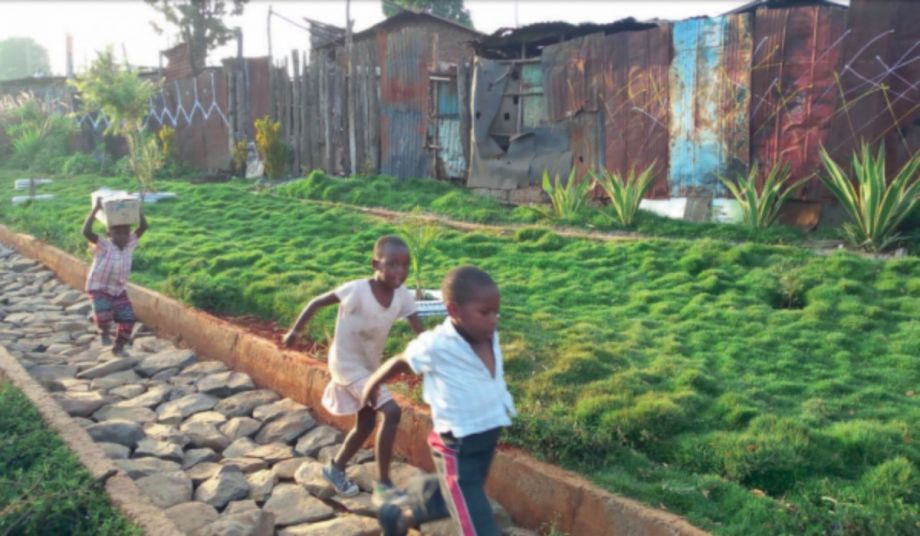
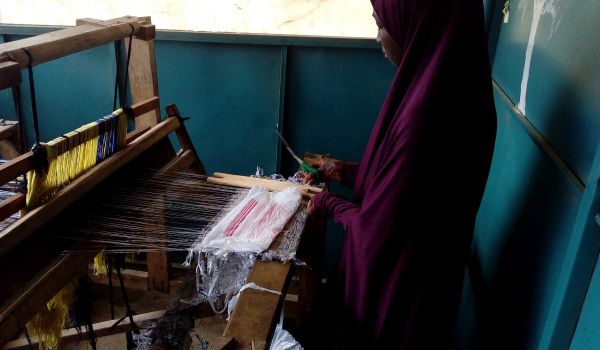
_600_350_80_s_c1.jpeg)
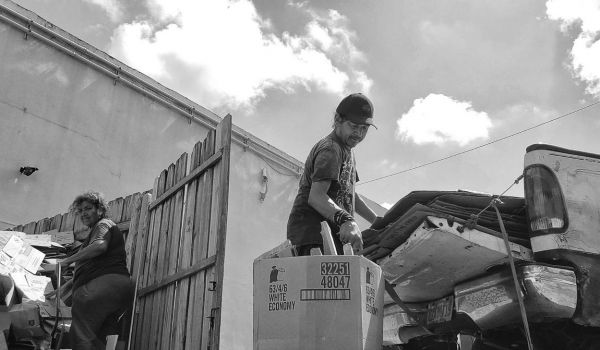
__Sean_Corrigan_from_Cleveland_Sews_(center)__and_Paula_Coggins_from_Oh_Sew_Powerful_(right)_sew_leftover_banners_from_the_NFL_Draft_into_handbags_-_photo_by_Sophie_Kannberg_600_350_80_s_c1.jpeg)

